HIST 1B
California State University - San Jose State University
Page 3 out of 34 results
Sort by
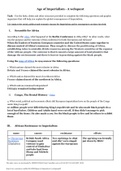
-
HIST 1b Impact of Imperialism - A webquest.
- Exam (elaborations) • 5 pages • 2023
- Available in package deal
-
- $8.49
- + learn more
Age of Imperialism - A When the leaders of fourteen European countries and the United States came together to discuss control of Africa’s resources. They sought to discuss the partitioning of Africa, establishing rules to amicably divide resources among the Western countries at the expense of the African people. The outcome is that it caused a large amount of land plunders that damage the environment and there is horror in practicing against the black people. Using the map of Africa in 19...
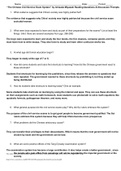
-
HIST 1b Examination System - Discussion Q_s.
- Exam (elaborations) • 3 pages • 2023
- Available in package deal
-
- $8.49
- + learn more
The Chinese Civil Service Exam System” by Ichisada Miyazaki Reading Questions & Discussion Prompts 1. What evidence suggests that China’s society was highly patriarchal? The evidence that suggests why China’ society was highly patriarchal because the civil service exam excluded women. 2. What were boys expected to learn and study as part of their preparations for the exams? List at least five things. (Hint: there are several examples from pgs. 288-290) The boys were expected to learn...

-
HIST 1b 3 Philosophies of China study guide
- Exam (elaborations) • 4 pages • 2023
- Available in package deal
-
- $8.49
- + learn more
Philosophies of China Selections from the Han Feizi: Chapter 49, “The Five Vermin” “There was a farmer of Song who tilled the land, and in his field was a stump. One day a rabbit, racing across the field, bumped into the stump, broke its neck, and died. Thereupon the farmer laid aside his plow and took up watch beside the stump, hoping that he would get another rabbit in the same way. But he got no more rabbits, and instead became the laughing stock of Song. Those who think they can ...
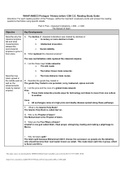
-
HIST 1b Copy of Post Classical Era 600 ce- 1200ce all answers correct, latest Fall 2023
- Exam (elaborations) • 5 pages • 2023
- Available in package deal
-
- $8.49
- + learn more
HAP AMSCO Prologue “History before 1200 C.E. Reading Study Guide Directions: For each reading section of the Prologue, define the important vocabulary words and answer the reading questions that follow using specific details Part 3: Post - Classical Civilizations, c 600 - c.1200 The Spread of Islam Objective Key Developments Describe why the classical empires fell and what characteristics allowed the post-classical empires to grow in their place. Describe how Islam spread in th...
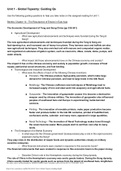
-
HIST 1b - Unit 1 - Global Tapestry_ Guiding Qs
- Other • 5 pages • 2023
- Available in package deal
-
- $8.49
- + learn more
Unit 1 - Global Tapestry: Guiding Qs Use the following guiding questions to help you take notes on the assigned reading for Unit 1. Bentley Chapter 14 - The Resurgence of Empire in East Asia The Economic Development of Tang and Song China (pp 335-341) ● Agricultural Development ○ What new agricultural advancements and techniques were founded during the Tang & Song? The new agricultural advancements and techniques founded during the Tang & Song are fast-ripening rice, and increased us...
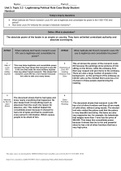
-
HIST 1b - Unit 3_ Legitimizing Political Rule (Student Handout) 2023
- Exam (elaborations) • 4 pages • 2023
- Available in package deal
-
- $8.49
- + learn more
Unit 3: Topic 3.2 - Legitimizing Political Rule Case Study Student Handout Today’s Inquiry Questions ● What methods did French monarch Louis XIV use to legitimize and consolidate his power in the 1450-1750 time period? ● How does Louis XIV embody the concept of absolute monarchy? Define: What is absolutism? The absolute power of the leader in an empire or country. They have unlimited centralized authority and absolute sovereignty. Artifact What methods did French monarch Louis XI...
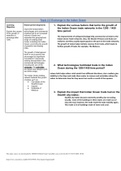
-
HIST 1b 2.3 Powerpoint Organizer latest Fall 2023
- Exam (elaborations) • 2 pages • 2023
- Available in package deal
-
- $8.49
- + learn more
Topic 2.3 Exchange in the Indian Ocean Learning Objective Explain the causes of the growth of networks of exchange after 1200. Historical Developments Improved transportation technologies and commercial practices led to an increased volume of trade and expanded the geographical range of existing trade routes, including the Indian Ocean, promoting the growth of powerful new trading cities. The growth of interregional trade in luxury goods was encouraged by significant innova...
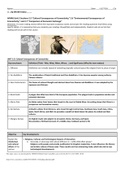
-
HIST 1b 2.5-2.7 Reading Questions.APWH|Unit 2 Sections 2.5 “Cultural Consequences of Connectivity,” 2.6 “Environmental Consequences of Connectivity,” and 2.7 “Comparison of Economic Exchange”
- Exam (elaborations) • 7 pages • 2023
- Available in package deal
-
- $8.49
- + learn more
UNIT 2.5| Cultural Consequences of Connectivity Key term/event Definition (Think - Who, What, When, Where…) and Significance (Why this term matters) 1. Diffusion (Definition not in book) Spread of something (typically cultural aspect like religion) from its place of origin 2. Zen Buddhism The combination of Daoist traditional and Chan Buddhism. It has become popular among ordinary Chinese citizens. 3. Neo-Confucianism The fusion of rational thought and abstract ideas from Daoism and Buddh...

-
HIST 1b Why the Industrial Revolution Didn't Happen in China (Student Questions)
- Exam (elaborations) • 2 pages • 2023
- Available in package deal
-
- $9.49
- + learn more
Unit 5: Why the Industrial Revolution Didn't Happen in China Comprehension Questions Instructions: Read the Washington Post article and respond to the following questions in COMPLETE, ERROR-FREE sentences. 1. Why do you think human life expectancy was 38 years old in 1750? People don't have a lot of knowledge about the food they eat and some people don't have access to good medicine for health care. 2. Why do you think the American life expectancy has risen to nearly 80 years old today...

-
HIST 1b Unit 4 - Labor Systems Graphic Organizer 1450-1750
- Exam (elaborations) • 3 pages • 2023
- Available in package deal
-
- $8.49
- + learn more
Unit 4: Labor Systems, 1450 - 1750 C.E. Encomienda Chattel Slavery Russian Serfdom ● Define the labor system ● Include the general role/purpose ● Were there revolts or rebellions associated with it? The Encomienda system was a labor system started by the Spanish crown in the American colonies, In this system, a Spanish Encomiendero was granted a number of native laborers who would pay tributes to him in exchange for his protection. A chattel slave is an enslaved child wh...

That summary you just bought made someone very happy. Also get paid weekly? Sell your study resources on Stuvia! Discover all about earning on Stuvia


